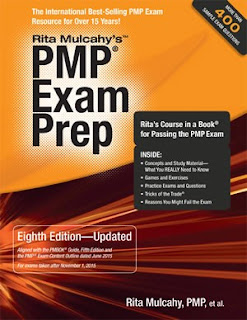10 Reasons to buy Rita Mulcahy’s PMP Exam Prep Book [Updated for PMBOK 5]
If you preparing for the PMP Exam, chances are that you already familiar with Rita Mulcahy’s PMP Exam Prep book. If you go by the Best PMP Exam Prep Book Survey, 65% respondents recommend this book over any other PMP Exam Prep guide. It’s easily the No.1 best-selling PMP Exam Prep book. While you would have heard several favorable comments about this book, you might have also come across some contrasting remarks from critics. Either you love it or you hate it - it’s that kind of a book. The critics point out the sarcastic and generally pessimistic tone of the book as the main reason for giving it a thumbs-down. If you have heeded to the advice of the critics and given this book a pass, let me tell you 10 reasons why it should be a part of your study plan.
10 Reasons to buy PMP Exam PrepPermalink
- PMI-isms: The key to passing the PMP Exam is to answer the questions the PMI-way (or PMI-isms). Knowing these PMI-isms is absolutely critical to passing the exam. No matter how good a project manager you are in the real world, you must answer the PMP Exam questions the PMI-way. I think I'm sounding like Rita Mulcahy now :) Chapter 1 of this book hits the nail on its head by listing 62 PMI-isms, which are absolutely essential for passing the exam. This gets you rolling immediately. You'll find many more PMI-isms throughout the book and specifically in the Professional and Social Responsibility Chapter.
- Rita's Process Chart: The Process Chart elaborates the PMBOK processes and make them easy to understand. While some critique that it distorts the standard vocabulary that PMI has established, but I would say it does help you get a different perspective on the PMBOK processes. She also emphasizes on the order of the planning processes that in itself is a key to answering many exam questions.
- The Sample Questions: The quality of the questions in Rita's book (and her PMP Fastrack Exam Simulator) is the best in my opinion. The book contains about 400 sample questions.
- Tricks of the Trade: Each chapter has several "Tricks of the Trade" sections, which offer very useful information and tricks for tackling exam questions and also dealing with project managements issues in real world.
- Succinctness: The book is written with a razor-sharp focus on the exam. The wording is precise, and content to the point. There are no wasted words in this book.
- Exercises: The book has tons of exercises. It really gives you an opportunity to think, write down your answers in blank spaces provided, look at the answers and compare notes to fill in your gaps.
- Games: The book includes many other exercises (read Games) such as Rita's Process Game, What-comes-before/after Game and Project Management Scrabble Game. The games really help get your mind around the course material. Just don't expect the same thrills as from your Playstation.
- Templates: The book provides some useful templates and samples of Project Management documents such as the Project Charter and WBS Dictionary. These are really useful for people who don't deal with these documents on their projects.
- Content Presentation: Use of visual cues, diagrams, charts, tables and bullet points rather than plain text, make the content easy to digest and remember.
- Insider Info: Last but not the least, the book gives lots of insider info like the psychology of the exam authors, how the exam questions are written, the important topics for the exam, Knowledge Area and Process Groups wise level of difficulty of exam questions, the common pitfalls, etc. Rita's knowledge and experience truly reflects in this book. After reading this book, you realize why she's a "household name" among PMP aspirants.
ConclusionPermalink
While I agree that the book has a general negative tone to it, so much so that it has a chapter named “Reasons you might fail the exam”, I still believe it’s an indispensable tool for the PMP Exam. Let me tell you a trick to reading this book (BTW, trick is Rita’s favorite word). The first time you read this book, strike-out all the stuff that you find negative, with a black marker. After that, you’ll be left with a really useful book.
If you are studying for the PMP Exam, I strongly recommend this book. It’s the “Gold Standard” in the PMP Certification world against which all other study material is measured.
Buy NowPermalink
You can purchase the book from Amazon by using the links below.

30 Comments
NoorAldeen
Harwinder Singh
abomesho
Harwinder Singh
Anonymous
See Soon
Harwinder Singh
Renren
Harwinder Singh
saikat
Dr. PDG
Harwinder Singh
Dr. PDG
Harwinder Singh
Dr. PDG
Anonymous
Dr. PDG
Anonymous
Harwinder Singh
Shariq
Anonymous
Dr. PDG
Saleem
Harwinder Singh
Saleem
Anonymous
Anonymous
Dr. PDG
Soma
Dr. PDG